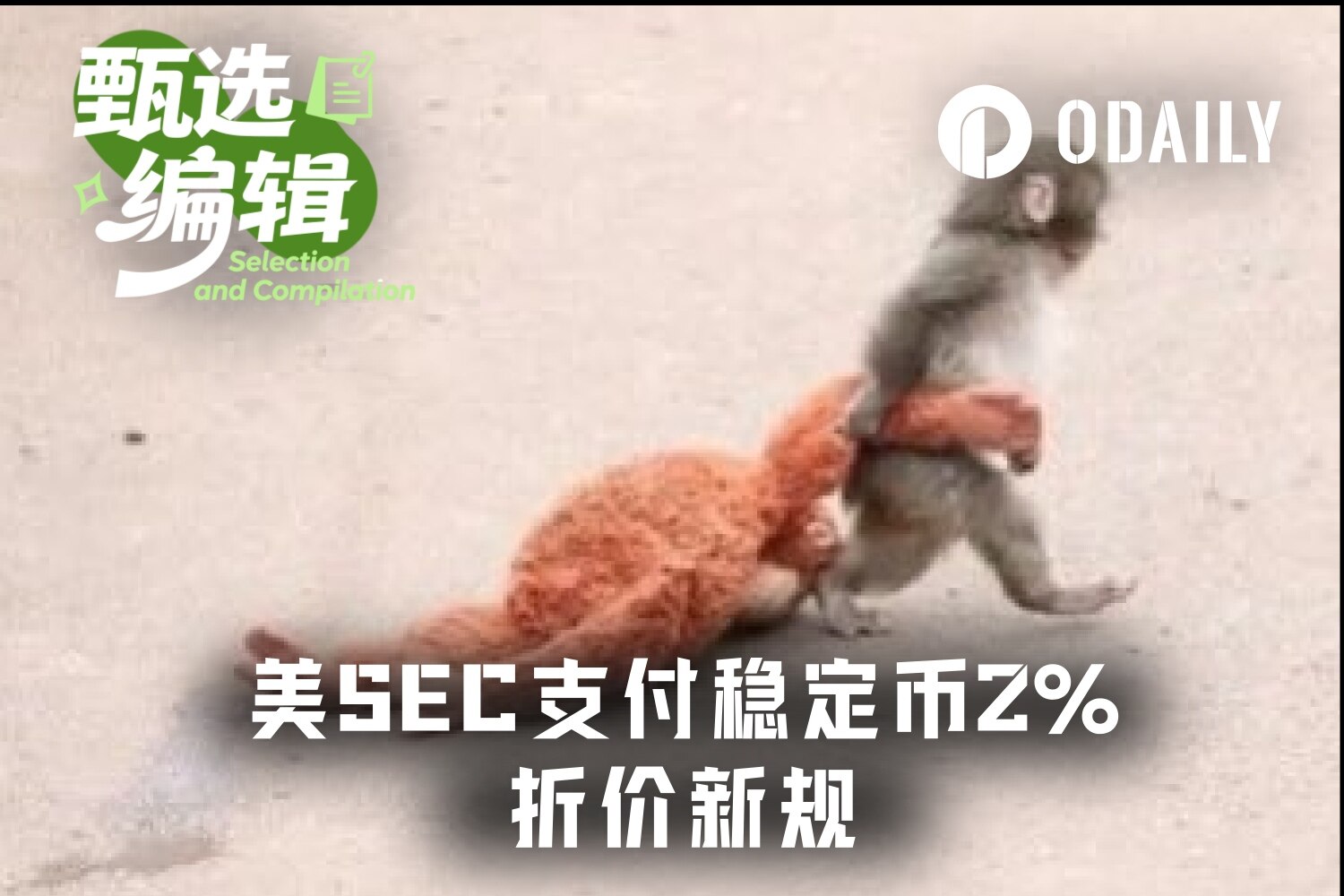Kill the Bluebird: Can X Chat become Musk's "Western WeChat"?
- 核心观点:马斯克推出加密通信工具X Chat。
- 关键要素:
- 采用比特币式P2P加密架构。
- 集成支付与AI功能。
- 挑战WhatsApp等传统巨头。
- 市场影响:推动隐私通信与加密支付发展。
- 时效性标注:中期影响。
The story begins with the disappearance of a lovebird... no, a bluebird.
Introduction: The Transformation from Twitter to X and the Birth of X Chat
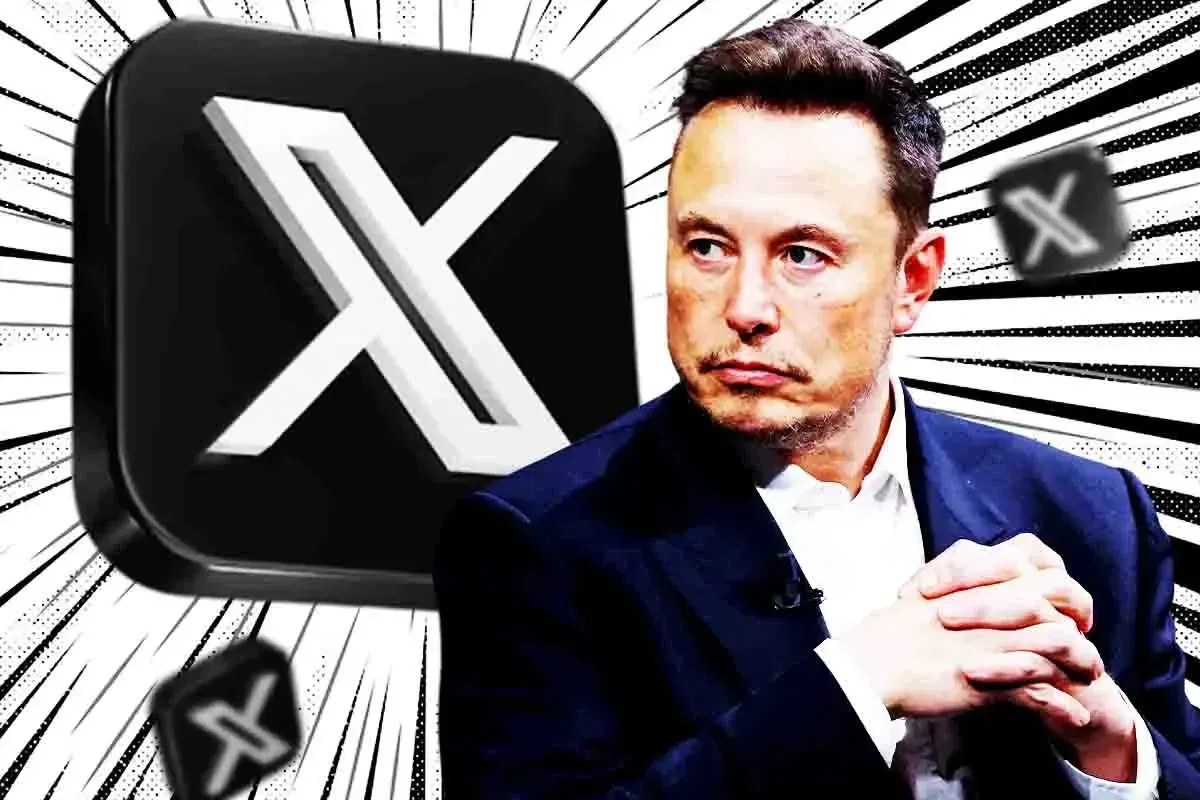
If Elon Musk were a fictional character, his story would be incredibly dramatic: a billionaire, a tech genius, and an ambitious visionary who changes the world, navigating the worlds of electric cars, rockets, and artificial intelligence.
In 2022, when he acquired Twitter for $44 billion, the latest chapter of this drama began. Twitter, once seen as a "digital town square," had become the center of global public discourse due to its 140-character limit. But in Musk's hands, in less than a year, this bluebird symbolizing global public dialogue was ruthlessly replaced by a cold black "X," the prototype of a super app he described as "omnipotent."
Now, three years later, the birth of X Chat has become the latest footnote to this transformation—an end-to-end encrypted communication tool that embodies Musk's obsession with privacy, freedom, and technological integration, while also pushing him into a head-on confrontation with traditional telecommunications giants.
But for observers on Wall Street and in Silicon Valley, the real question is: Is this a communications revolution, or just another high-profile marketing campaign to mask the predicament X platform faces in advertising revenue?
I. Historical Background: Musk's Love-Hate Relationship with Twitter/X (2022-2024)
The seed of this ambition was sown as early as 2017. At that time, Elon Musk, then 46, was busy with his relationship with Aquaman, getting a hair transplant, and saving the world. After several twists and turns, he bought the domain name of his "first love company"—X.com . Five years later, this seed grew into a towering tree that swallowed Twitter.
In 2017, Musk spent a fortune to buy back the x.com domain—a digital asset that once belonged to his early startup, X.com (which later merged with PayPal). At the time, few realized that this seemingly nostalgic move was actually the prelude to a much grander plan. The domain's true value only became apparent five years later when Musk began criticizing Twitter's content moderation policies.
The acquisition process in 2022 was itself a business thriller: acquisitions plus layoffs?
Musk initially offered $54.20 per share for the acquisition, then attempted to withdraw, but ultimately completed the $44 billion deal in October of the same year under legal pressure. So, what exactly does this investment represent?
If converted to aircraft carriers, this amount of money would be enough to build three Ford-class aircraft carriers —the Ford-class carriers are among the most advanced and expensive warships in the world, each costing a staggering $13 billion . In other words, Musk spent a fortune comparable to building three supercarriers when he acquired Twitter—this was the "ammunition" Musk invested in this acquisition.
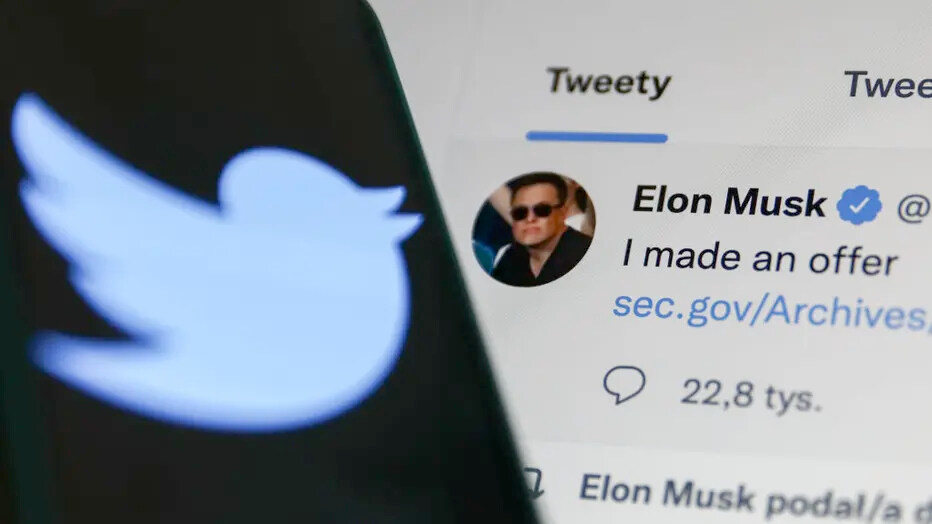
Immediately after the acquisition, he launched what was dubbed "the most radical corporate restructuring in Silicon Valley history": more than 50% of the staff were laid off, including most of the content moderation team. The remaining staff were also required to work overtime under a "hardcore work mode." This radical management style demoralized Twitter but also saved the company huge amounts of human resources costs.
At the same time, Musk launched a paid "Blue V" subscription model, hoping to generate revenue through user payments rather than advertising. However, this model sparked widespread controversy, leading to a large number of advertisers withdrawing their funding and a significant drop in Twitter's revenue.
Lax content moderation policies and algorithmic bias: Reality quickly dealt Musk a heavy blow.
To attract more users, Musk relaxed content moderation policies and even restored access to some far-right accounts. While this lenient policy brought a short-term increase in traffic, it also led to a surge in hate speech and misinformation, further scaring away advertisers. By mid-2023, Twitter's brand image had been severely damaged, and user trust had declined significantly. Many well-known advertisers, including major brands such as Apple and Disney, chose to reduce or suspend their advertising on the platform, resulting in a more than 50% drop in Twitter's advertising revenue .
From Twitter to X: Falling in love with WeChat and renaming and upgrading Bluebird
In July 2023, Musk announced that Twitter would be renamed "X" and positioned as an "everything app." This idea was clearly inspired by the Chinese app WeChat.
He has expressed his admiration for WeChat on numerous public occasions (such as employee meetings and podcasts), referring to it as a blueprint for X, and calling it an "excellent app" and a "good model" at the All-In Summit 2022.
WeChat is not only a chat tool, but also a payment platform, e-commerce portal, and content distribution channel. Musk hopes to create a similar super app with X, but the challenges he faces are more complex than those of WeChat. Western users' sensitivity to privacy, stringent regulatory scrutiny, and the formidable strength of competitors are all issues that X must confront.
Subsequently, the X platform launched video and audio calling features that same year and began testing payment functionality. More importantly, Musk integrated his artificial intelligence company, xAI, into the X platform, laying the foundation for the AI capabilities of X Chat later on. By early 2024, X had ceased to be merely a social media platform, but rather an evolving digital ecosystem.
II. Development Context: The Evolution of X Chat from Concept to Launch (2024-2025)
While Wall Street analysts are scratching their heads over the advertising revenue of the X platform, the previously low-key private messaging feature in Musk's "digital harem" is making a name for itself. Once relegated to a supporting role, it's about to launch its own independent platform, codenamed "X Chat."
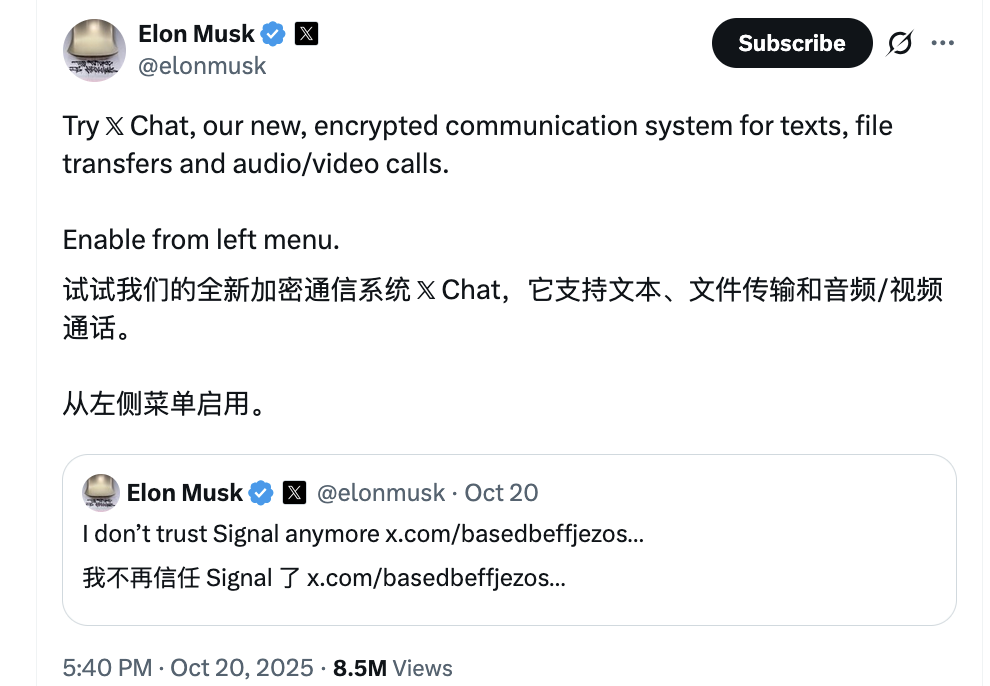
In September 2024, Musk first hinted on the X platform that public posting and private messaging would be separated, with private messaging becoming a more secure and focused communication tool. Users could communicate via private messaging solely through X. This statement sparked endless speculation about X Chat.
On June 1, 2025, X Chat's beta version was officially launched, opening testing to a select group of users. This tool features end-to-end encryption, disappearing messages, file sharing, and audio/video calls, and claims to employ a decentralized encryption architecture similar to Bitcoin. On October 20, X Chat's v0.1 version entered public beta, attracting millions of users to try it. By the end of October, Musk officially announced plans to make X Chat a standalone application, employing a Bitcoin-like P2P encryption architecture, and explicitly stated its intention to challenge traditional communication giants like WhatsApp and Signal.
The key timeline is as follows:
- September 11, 2024: Musk hinted at "decoupling public posts from private messages," allowing users to send private messages using only X.
- June 1, 2025: X Chat beta integrated rollout. Musk announced in a post: "The all-new X Chat is here, supporting encryption, disappearing messages, arbitrary file sending, and audio/video calls. Built on Rust, using Bitcoin-style encryption, a completely new architecture."
- October 20, 2025: v0.1 version public beta, Musk encourages trial: "Try 𝕏 Chat, our encrypted communication system that supports text, file transfer and calls. Enable it from the left menu."
- October 31, 2025: Privacy features updated, and a standalone app is revealed to launch "in the coming months" on the Joe Rogan podcast, emphasizing P2P encryption and Visa payment integration.
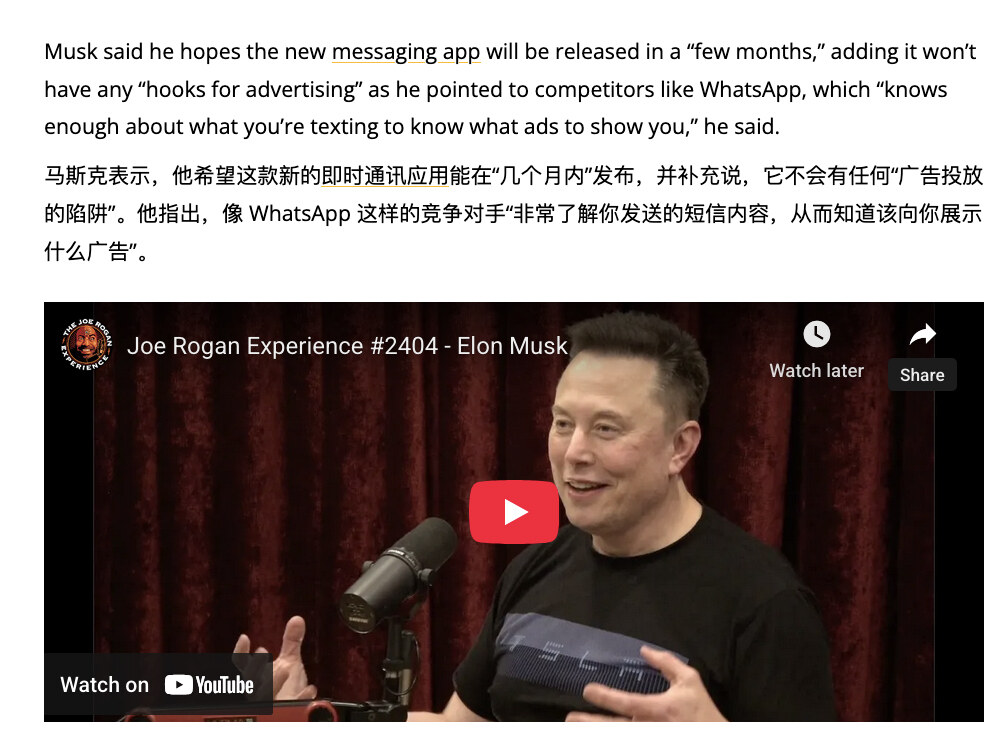
Source: YouTube
III. Core Functions and Technological Highlights: Privacy-Prioritized "Bitcoin-Style" Innovation
The first protective shield X Chat unveiled was a set of crypto armor touted as being "the same as Bitcoin's".
X Chat's core focus is on privacy protection, which is fully reflected in its encryption technology. It employs end-to-end encryption (E2EE) , a decentralized encryption technology similar to Bitcoin, which is a peer-to-peer (P2P) architecture that ensures that only the two communicating parties can decrypt messages, and no third party can eavesdrop.
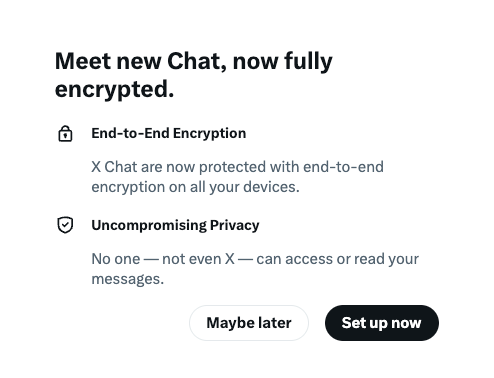
To further enhance security and operational efficiency, the development team chose Rust, a modern programming language renowned for its high performance and security, and refactored the entire communication module, thereby reducing potential security vulnerabilities. Even more surprisingly, X Chat claims not to collect user metadata—a stance considered an outlier in the data-driven tech industry.
Functionally, X Chat covers all the essentials of a modern communication tool : disappearing messages allow users to set an automatic deletion time for chat history; file sharing supports single file transfers up to 2GB; and audio and video calls integrate xAI's real-time voice optimization technology to ensure low latency and high clarity. Furthermore, X Chat also features seamless integration with the X platform, allowing users to share posts or media content directly within chats. This "platform + communication" model is considered a key part of Musk's "everything applies" strategy.
From the perspective of observers in the crypto industry, the future launch of X Chat will be far more than just a product showcase; it's more like dropping a "new narrative bomb" on the entire industry. Its Bitcoin-like cryptographic design effectively introduces blockchain-level security standards into everyday communication tools—a move that could potentially drive more attention to privacy coins in privacy payment scenarios. Even more intriguing is the subtle "chemical reaction" between X Money's built-in payment functionality and Coinbase's x402 payment protocol, launched in May 2025: the former supports crypto tipping, while the latter is designed for instant micropayments via AI agents.
If these two technologies are truly integrated, then AI-driven privacy payment scenarios will no longer be just theoretical. Of course, the most direct beneficiary will likely be Dogecoin—after all, this "Shiba Inu" has never lacked a role in Musk's business empire.
IV. Challenges and Controversies: X Chat's Internal and External Dilemmas
The road to new power is never smooth: the realities are often turbulent.
Technically, while X Chat's end-to-end encryption has won applause from privacy advocates, the stability of its P2P architecture under high concurrency scenarios remains to be tested. During its public beta in 2025, some users reported message delays and disconnections, raising questions about its ability to handle the pressure of a global user base.
In the market, X Chat faces fierce competition: WhatsApp boasts over 2 billion users, Signal has amassed a huge following with its privacy-focused approach, and Telegram has established itself among users seeking greater freedom through its channels, large groups, and censorship-resistant features. How Musk will break through in this highly competitive market remains to be seen.
Perhaps the more pressing issue is trust. Since Musk took over, Platform X has faced repeated criticism regarding data privacy and content moderation.
Despite X Chat's promise not to collect metadata, user trust in Musk himself is mixed. Some commentators have pointedly asked, "How can a platform that relies on advertising revenue truly prioritize privacy?" Furthermore, regulatory pressure cannot be underestimated. The EU's MiCA Act and US privacy legislation could pose challenges to X Chat's operating model, particularly regarding data storage and cross-border transfers.
V. Future Outlook: Can X Chat become the "Western WeChat"?
So, will this highly anticipated "newcomer" ultimately be able to be crowned?
Musk has never hidden his admiration for the WeChat model: a super app integrating communication, payment, social networking, and services. If X Chat can successfully become independent and deeply integrate with the X platform's payment, AI, and content ecosystem, it might become the prototype of a "Western WeChat."
However, cultural and market differences may pose obstacles. WeChat's success is inseparable from China's highly centralized mobile internet ecosystem and users' reliance on single applications, while Western users are more accustomed to decentralized, functional applications.
Furthermore, the conflict between X Chat's privacy commitment and commercialization needs remains unresolved: if advertising or paid features are introduced, will the platform deviate from its "privacy-first" principle? The emergence of X Chat is not only a crucial step in the transformation of the X platform but also a bold challenge to the modern communications industry. Whether it can find a balance between privacy and functionality, and whether it can stand firm amidst competition and regulation, remains to be seen .
One thing is certain: even if Musk's vision cannot be fully realized, X Chat's very existence has already changed the game. The future of the communications industry may not be dominated by a single super app, but rather by fierce competition among various platforms in terms of privacy, functionality, and user experience.
Ultimately, users worldwide will benefit—and that may be the greatest value X Chat brings.


